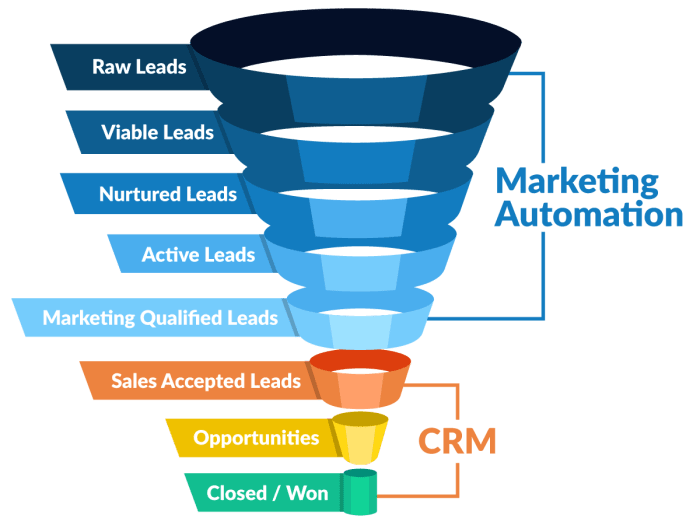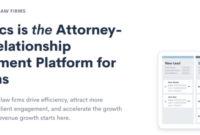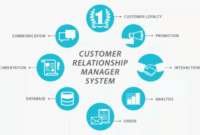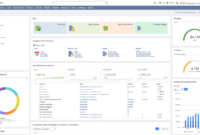CRM and marketing automation sets the stage for a powerful partnership, transforming how businesses engage with customers and drive sales. This dynamic duo seamlessly integrates customer relationship management (CRM) with automated marketing processes, enabling companies to nurture leads, personalize interactions, and optimize marketing campaigns for maximum impact.
By combining the power of CRM to manage customer data and insights with the efficiency of marketing automation to execute targeted campaigns, businesses can create a unified customer experience. This approach fosters stronger customer relationships, increases brand loyalty, and ultimately fuels growth.
Introduction to CRM and Marketing Automation
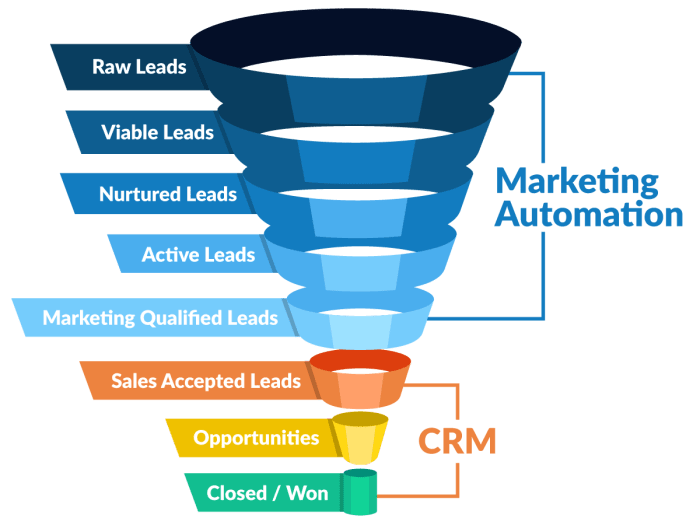
In today’s competitive business landscape, companies are constantly seeking ways to improve customer relationships and enhance marketing efforts. Two powerful tools that can help achieve these goals are Customer Relationship Management (CRM) and Marketing Automation. This section will explore the fundamentals of CRM and marketing automation, delve into their integration benefits, and provide real-world examples of companies that have successfully implemented these strategies.
Defining CRM and Marketing Automation
CRM and marketing automation are distinct yet interconnected technologies that streamline business operations and enhance customer engagement.
- CRM (Customer Relationship Management):CRM systems are designed to manage and organize customer interactions and data. They provide a centralized platform to store and access customer information, track interactions, and manage sales pipelines.
- Marketing Automation:Marketing automation software automates repetitive marketing tasks, such as email campaigns, social media posting, and lead nurturing. It helps marketers reach the right audience at the right time with personalized messages, leading to improved campaign effectiveness and efficiency.
Benefits of Integrating CRM and Marketing Automation
Integrating CRM and marketing automation offers numerous benefits for businesses of all sizes.
- Personalized Customer Experiences:By combining customer data from CRM with marketing automation capabilities, businesses can create highly personalized marketing campaigns. This allows them to deliver targeted messages and offers based on individual customer preferences and behaviors.
- Improved Lead Nurturing:Marketing automation tools can automate lead nurturing processes, ensuring that potential customers receive relevant information and offers throughout the sales funnel. This helps to qualify leads, build relationships, and ultimately convert them into paying customers.
- Increased Sales Efficiency:Integrating CRM and marketing automation can streamline sales processes by automating tasks such as lead qualification, follow-up, and reporting. This allows sales teams to focus on high-value activities, such as building relationships and closing deals.
- Enhanced Customer Loyalty:By providing personalized experiences and addressing customer needs effectively, businesses can foster stronger customer relationships and increase loyalty.
Real-World Examples of Successful CRM and Marketing Automation Implementations
Numerous companies have successfully leveraged CRM and marketing automation to achieve significant business outcomes.
- HubSpot:A leading provider of inbound marketing and sales software, HubSpot uses its own CRM and marketing automation platform to generate leads, nurture prospects, and close deals. Their integrated system allows them to track customer interactions across multiple channels, personalize marketing campaigns, and measure campaign effectiveness.
- Amazon:The e-commerce giant uses CRM and marketing automation to personalize recommendations, send targeted promotions, and manage customer service interactions. Amazon’s sophisticated system analyzes customer purchase history, browsing behavior, and other data points to provide highly relevant and personalized experiences.
- Salesforce:As a leading CRM provider, Salesforce itself leverages its platform to manage customer relationships, track sales pipelines, and automate marketing tasks. They use marketing automation to personalize email campaigns, segment audiences, and measure campaign performance.
Key Features of CRM and Marketing Automation
CRM and marketing automation systems offer a wide range of features designed to streamline business processes, enhance customer engagement, and drive sales. By integrating these features, businesses can achieve a holistic approach to customer relationship management and marketing.
CRM and Marketing Automation Features
| Feature | CRM | Marketing Automation | Benefits |
|---|---|---|---|
| Contact Management | Centralized database for storing customer information, including contact details, purchase history, and communication preferences. | Segmentation and personalization of marketing messages based on customer data. | Improved customer understanding, targeted marketing campaigns, and personalized experiences. |
| Lead Nurturing | Automated workflows for nurturing leads through the sales funnel, providing relevant content and communication at different stages. | Automated email sequences, drip campaigns, and personalized content delivery to nurture leads and move them through the sales funnel. | Increased lead conversion rates, improved customer engagement, and shortened sales cycles. |
| Sales Pipeline Management | Visual representation of the sales process, tracking leads and opportunities from initial contact to closure. | Automated lead scoring and qualification based on customer behavior and engagement metrics. | Improved sales forecasting, efficient resource allocation, and increased sales productivity. |
| Email Marketing | Integration with email marketing platforms for sending targeted email campaigns and newsletters. | Automated email triggers, personalized content, and email analytics for optimizing campaigns. | Increased open and click-through rates, improved customer engagement, and enhanced brand awareness. |
| Social Media Marketing | Integration with social media platforms for managing social media presence and engaging with customers. | Automated social media posting, engagement tracking, and social media advertising campaigns. | Increased brand visibility, improved customer interaction, and expanded reach. |
| Lead Scoring | Assigning scores to leads based on their behavior and engagement, prioritizing high-potential leads for sales follow-up. | Automated lead scoring based on customer interactions, website activity, and engagement with marketing campaigns. | Improved lead qualification, efficient resource allocation, and increased sales conversion rates. |
Implementing CRM and Marketing Automation
Implementing CRM and marketing automation requires careful planning and execution to ensure a smooth transition and maximize benefits. This section explores the key steps involved in the implementation process, from selecting the right platforms to integrating them with existing business systems and setting up effective workflows.
Choosing the Right CRM and Marketing Automation Platforms
Choosing the right CRM and marketing automation platforms is crucial for successful implementation. It involves evaluating various factors and considering your specific business needs.
- Define your business goals and objectives:Clearly define what you want to achieve with CRM and marketing automation. Do you want to improve customer relationships, streamline sales processes, automate marketing campaigns, or gain valuable insights into customer behavior?
- Assess your current business processes:Analyze your existing workflows, identify pain points, and understand how CRM and marketing automation can address these challenges.
- Research and compare different platforms:Explore various CRM and marketing automation platforms available in the market, considering factors such as features, pricing, scalability, integration capabilities, and user-friendliness.
- Consider your budget and resources:Evaluate the cost of different platforms and ensure they align with your budget. Also, consider the resources required for implementation, including training, technical support, and ongoing maintenance.
- Get user feedback:Involve key stakeholders in the selection process and gather feedback from users who will be using the platform. This helps ensure the chosen platform meets their needs and preferences.
Integrating CRM and Marketing Automation Platforms
Integrating CRM and marketing automation platforms with your existing business systems is essential for data flow and efficiency.
- Identify integration points:Determine which systems need to be integrated, such as your website, email marketing platform, accounting software, and other relevant applications.
- Choose integration methods:Select appropriate integration methods, such as API connections, data synchronization, or third-party tools.
- Test and validate integrations:Thoroughly test and validate integrations to ensure data accuracy and seamless communication between systems.
Setting Up and Configuring CRM and Marketing Automation Workflows
Setting up and configuring CRM and marketing automation workflows is crucial for automating tasks and optimizing processes.
- Define your target audience:Identify your ideal customer segments and create personas to personalize your marketing efforts.
- Map out customer journeys:Understand the different stages of the customer journey and create workflows that guide customers through each stage.
- Automate tasks and processes:Utilize automation features to streamline repetitive tasks, such as lead nurturing, email marketing, and data entry.
- Set up triggers and conditions:Define triggers and conditions that activate specific workflows based on customer actions or data points.
- Monitor and analyze results:Track the performance of your workflows, analyze data, and make adjustments as needed to optimize results.
CRM and Marketing Automation in Action
CRM and marketing automation aren’t just theoretical concepts; they’re powerful tools that can transform how businesses interact with their customers. By integrating these technologies, companies can achieve specific marketing goals, enhance customer experiences, and ultimately drive business growth.
Lead Generation
Lead generation is a crucial aspect of any successful marketing strategy. CRM and marketing automation can be instrumental in attracting potential customers and converting them into qualified leads.
- Targeted Marketing Campaigns:CRM systems allow businesses to segment their audience based on demographics, interests, and past interactions. This enables them to create personalized marketing campaigns that resonate with specific target groups. For example, a clothing retailer could use CRM to segment its audience by age, gender, and clothing style preferences, then send targeted email campaigns featuring relevant products.
- Landing Pages and Forms:Marketing automation platforms facilitate the creation of optimized landing pages and forms that capture valuable lead information. By integrating these landing pages with CRM, businesses can automatically capture and store lead data, enabling them to nurture leads effectively. For instance, a software company could use marketing automation to create a landing page for a free trial offer, where visitors can submit their contact information and receive a personalized follow-up email series.
- Social Media Integration:CRM and marketing automation tools can be integrated with social media platforms to identify and engage with potential leads. For example, a business could use social media listening tools to monitor conversations about their industry or products, identify potential leads who are expressing interest, and then reach out to them with relevant offers or information.
Customer Retention
Retaining existing customers is often more cost-effective than acquiring new ones. CRM and marketing automation play a vital role in building customer loyalty and encouraging repeat purchases.
- Personalized Communication:CRM systems allow businesses to track customer interactions, purchase history, and preferences, enabling them to personalize communication efforts. This can involve sending targeted emails, SMS messages, or even personalized recommendations based on past behavior. For example, an online retailer could use CRM to send personalized emails to customers who have recently purchased a product, recommending similar items or offering exclusive discounts.
- Loyalty Programs:CRM and marketing automation can power loyalty programs that reward customers for their repeat business. These programs can include points-based systems, exclusive discounts, or personalized offers. For example, a coffee shop could use CRM to track customer purchases and reward them with free drinks or discounts based on their spending.
- Customer Support and Service:CRM systems can streamline customer support processes, ensuring that customers receive prompt and personalized assistance. By tracking customer inquiries and resolving issues efficiently, businesses can build trust and encourage customer loyalty. For instance, a software company could use CRM to track customer support tickets, provide automated responses to common questions, and escalate complex issues to the appropriate support team.
Brand Building
CRM and marketing automation can be used to build a strong brand identity and enhance customer perception.
- Content Marketing:CRM and marketing automation platforms can help businesses create and distribute engaging content that aligns with their brand values. By tracking content performance and audience engagement, businesses can optimize their content strategy to resonate with their target audience. For example, a travel agency could use CRM to segment its audience based on travel preferences and then create targeted blog posts, articles, and social media content that appeal to specific groups.
- Social Media Engagement:CRM and marketing automation can enhance social media engagement by automating tasks like scheduling posts, monitoring mentions, and responding to comments. This helps businesses build relationships with their followers, increase brand awareness, and foster a sense of community. For example, a clothing brand could use marketing automation to schedule social media posts promoting new collections, respond to customer inquiries, and run contests and giveaways to engage their audience.
- Email Marketing:CRM and marketing automation enable businesses to send targeted and personalized email campaigns that reinforce their brand message. This can involve sending newsletters, product updates, or special offers that resonate with customers’ interests and preferences. For example, a beauty brand could use CRM to send personalized email newsletters featuring product recommendations, exclusive offers, and beauty tips tailored to each customer’s skin type and preferences.
Personalization
CRM and marketing automation empower businesses to personalize customer experiences, fostering a sense of individual attention and building stronger relationships.
- Personalized Content:CRM systems allow businesses to gather data about customer preferences, interests, and past behavior, enabling them to deliver personalized content that resonates with each individual. This can include tailored product recommendations, personalized email campaigns, and customized website experiences. For example, an online bookstore could use CRM to recommend books based on a customer’s reading history, purchase history, and book reviews they’ve written.
- Targeted Offers and Promotions:CRM and marketing automation can be used to send targeted offers and promotions that are relevant to each customer’s interests and needs. This can involve offering discounts on products they’ve previously purchased, promoting new products related to their past purchases, or sending birthday greetings with special offers.For example, a clothing retailer could use CRM to send personalized discount codes to customers based on their past purchase behavior and preferred brands.
- Personalized Communication Channels:CRM and marketing automation allow businesses to communicate with customers through their preferred channels, such as email, SMS, or social media. This ensures that messages reach customers where they are most likely to engage, enhancing the overall customer experience. For example, a restaurant could use CRM to send SMS reminders about upcoming reservations, personalized email updates about new menu items, or social media messages promoting special events.
Data Analytics
Data analytics is crucial for optimizing CRM and marketing automation campaigns. By analyzing data collected from customer interactions, businesses can gain valuable insights into customer behavior, preferences, and needs.
- Campaign Performance Tracking:CRM and marketing automation platforms provide detailed analytics on campaign performance, allowing businesses to track metrics like open rates, click-through rates, conversion rates, and return on investment (ROI). This data helps businesses identify what’s working and what’s not, enabling them to optimize their campaigns for better results.For example, an e-commerce company could use CRM analytics to track the performance of different email campaigns, identify the most effective subject lines and content, and adjust their strategy accordingly.
- Customer Segmentation:Data analytics can help businesses segment their customer base based on demographics, purchase history, website behavior, and other factors. This allows them to create more targeted marketing campaigns and personalize customer experiences. For example, a financial institution could use CRM analytics to segment its customer base based on their income level, investment goals, and risk tolerance, then send targeted marketing materials and financial advice tailored to each segment.
- Predictive Analytics:CRM and marketing automation tools can use predictive analytics to identify patterns in customer behavior and predict future actions. This allows businesses to anticipate customer needs, personalize their interactions, and proactively address potential issues. For example, a subscription service could use predictive analytics to identify customers who are at risk of churning and send them personalized offers or targeted communication to encourage them to stay.
Challenges and Opportunities
Implementing CRM and marketing automation, while offering significant advantages, also presents challenges that need careful consideration. This section explores the potential obstacles and opportunities associated with these technologies.
Challenges
Challenges in implementing CRM and marketing automation can arise from various aspects, including data privacy concerns, integration issues, and resistance to change.
| Challenges | Opportunities |
|---|---|
| Data privacy concerns: The collection and storage of vast amounts of customer data raise ethical and legal concerns regarding data privacy. Regulations like GDPR (General Data Protection Regulation) require organizations to be transparent about data collection practices and provide customers with control over their data. Failure to comply with these regulations can result in hefty fines and damage to the organization’s reputation. | Enhanced customer relationships: CRM and marketing automation tools can help organizations gather valuable insights into customer preferences and behavior, enabling them to personalize their marketing efforts and provide tailored experiences. This can foster stronger customer relationships, leading to increased loyalty and satisfaction. |
| Integration issues: Integrating CRM and marketing automation systems with existing business applications can be a complex and time-consuming process. Different systems may have incompatible data formats and workflows, requiring significant effort to ensure seamless data flow and avoid inconsistencies. | Improved efficiency and productivity: Automation of repetitive tasks such as email marketing, lead nurturing, and customer support can free up valuable time for employees to focus on more strategic initiatives. This can lead to improved efficiency and productivity across the organization. |
| Resistance to change: Employees may resist adopting new technologies due to concerns about their job security, lack of training, or simply a preference for traditional methods. Overcoming this resistance requires clear communication, adequate training, and demonstrating the benefits of using CRM and marketing automation. | Data-driven decision making: CRM and marketing automation systems provide access to real-time data and analytics, enabling organizations to make informed decisions based on concrete evidence. This data-driven approach can help optimize marketing campaigns, identify new opportunities, and improve overall business performance. |
Opportunities
Despite the challenges, CRM and marketing automation present significant opportunities for organizations to enhance their customer relationships, improve efficiency, and gain a competitive edge.
Future Trends in CRM and Marketing Automation
The world of customer relationship management (CRM) and marketing automation is constantly evolving, driven by technological advancements and changing customer expectations. As businesses strive to enhance customer engagement and drive growth, several emerging trends are shaping the future of these fields.
These trends are fueled by the increasing adoption of artificial intelligence (AI), machine learning (ML), and the ever-growing demand for personalized experiences.
Impact of Artificial Intelligence and Machine Learning
AI and ML are revolutionizing CRM and marketing automation by enabling businesses to analyze vast amounts of data, identify patterns, and make predictions about customer behavior. This data-driven approach allows for more effective customer segmentation, targeted marketing campaigns, and personalized interactions.
- Predictive Analytics:AI and ML algorithms can analyze historical data to predict customer churn, identify potential leads, and anticipate future purchasing behavior. This empowers businesses to proactively address customer needs and optimize their marketing efforts. For instance, a retail company could use predictive analytics to identify customers who are likely to make a purchase soon and send them targeted promotions.
- Chatbots and Virtual Assistants:AI-powered chatbots and virtual assistants are becoming increasingly sophisticated, providing 24/7 customer support and automating routine tasks. These intelligent agents can understand natural language, answer questions, and even resolve customer issues, freeing up human agents to focus on more complex tasks.For example, a travel agency could use a chatbot to answer common questions about flight bookings, hotel reservations, and travel destinations.
- Personalized Marketing:AI and ML can personalize marketing messages and recommendations based on individual customer preferences and behaviors. This creates a more engaging and relevant experience, leading to increased customer satisfaction and loyalty. For example, an e-commerce platform could use AI to recommend products based on a customer’s browsing history, past purchases, and demographic information.
Wrap-Up: Crm And Marketing Automation
In conclusion, CRM and marketing automation represent a powerful force in today’s digital landscape. By leveraging the benefits of both, businesses can unlock a wealth of opportunities to streamline operations, enhance customer engagement, and drive measurable results. As technology continues to evolve, the integration of CRM and marketing automation will only become more sophisticated, offering even greater potential for businesses to connect with customers in meaningful ways.
Commonly Asked Questions
What are some examples of CRM and marketing automation tools?
Popular CRM and marketing automation tools include HubSpot, Salesforce, Marketo, Mailchimp, and Zoho CRM. These platforms offer a range of features to meet the needs of different businesses.
How can I measure the success of my CRM and marketing automation efforts?
Key metrics to track include lead generation, conversion rates, customer lifetime value, email open and click-through rates, and return on investment (ROI).
What are the potential risks of using CRM and marketing automation?
Potential risks include data security breaches, integration challenges, and the need for ongoing maintenance and updates.

